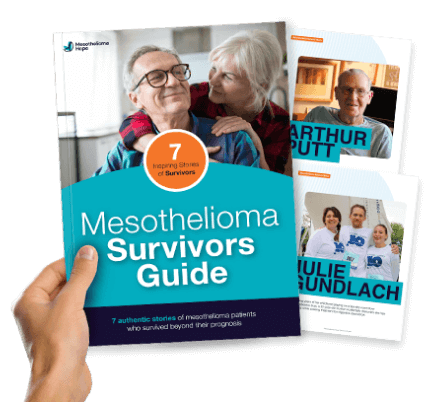From home care for terminally ill patients to a law firm executive assisting clients, a retired registered nurse examines her unique career at the intersection of health and advocacy
“You would be amazed and fascinated at the heartfelt stories you hear when you’re helping patients with their daily routines,” reveals Amy Fair, a retired registered nurse whose area of expertise previously involved providing in-home care for the elderly. “I could never pass up the opportunity to listen to their personal stories.”
Upon noticing how much she enjoyed her 8-week rotations in local nursing homes as a nursing student, Amy began her career working with terminally ill patients in the home health care space.
But after a four-year stint at a caregiver agency, Amy began her 20-year journey as a health care provider and the director of medical relations at Simmons Hanly Conroy, a leading mesothelioma law firm.
Retired as of 2021, Amy now serves the cancer community as a Patient Advocate at Mesothelioma Hope, where she regularly speaks with recently diagnosed patients and their families as they attempt to understand the implications of this life-changing news.
Find out what Amy had to say about the root of her compassion for the elderly, her deep respect for military veterans, and the most common questions she is asked by families seeking hope during a time of immense emotional hardship.
A Phone Call Away
“Patients call me before they even speak with an oncologist,” shares Amy. “For many patients, I am the first person they go to for guidance.”
During a typical day, Amy receives numerous phone calls from patients and their loved ones who want to learn more about mesothelioma from a trusted source. Amy’s compassion and expertise in managing this rare form of cancer allow her to answer all of their questions with the utmost care.
According to Amy, most callers have just received a mesothelioma diagnosis either for themselves or their parents.
Three of the most common questions people ask include:
- What should I ask the oncologist and/or surgeon?
- Who is the best mesothelioma specialist in the country?
- Where can I go for emotional support?
Amy provides her callers with a handout of common questions and medical terminology definitions to review prior to their upcoming doctor’s appointment. When determining which mesothelioma specialist to refer them to, Amy asks where they currently live in order to find the best fit for treatment.
For patients seeking support through the grieving process, Amy mails out a copy of the 56-page colorfully illustrated book Tear Soup: A Recipe for Healing After Loss by Pat Schwiebert and Chuck DeKlyen.
In the last few years, Amy has noticed that most people looking for emotional support are elderly widows who recently lost their husbands to cancer. If they need to talk to someone about their pain, Amy refers them to online support groups that they can access from their smartphones. She also sometimes lends an ear as someone they can lean on.
“Most of them don’t want to leave their homes or see anyone in person,” she says. “They just want to be on their phones, hearing stories from other widows or patients who need the same type of support.”
Down to a Science
When comparing a mesothelioma diagnosis given 20 years ago to one today, Amy points out that there have been tremendous strides in the amount of emotional, psychological, and medical care available.
“Twenty years ago, people were much more terrified of the disease because we didn’t have a lot of resources to help patients,” Amy notes. “Oncologists didn’t know where to refer patients — and some of them didn’t even know how to pronounce the word ‘mesothelioma,’ so it was just referred to as ‘meso.’”
Amy highlights that both peritoneal and pleural mesothelioma patients now have a better chance of living longer with treatment, emphasizing the critical role of a supportive environment for patients and their families.
“We’ve come a long way with being able to help people properly,” she says. “With such substantial advancements in the knowledge that we have about the disease and the different treatment options that are available, there is much greater hope for people now than ever before.”
“With the current treatment modalities, patients are sometimes able to live much longer.”
—Amy Fair
In the Army
Several of Amy’s closest family members have served in the U.S. Armed Forces. It began with her father, who served in the Army as a major. Her brother joined the Army at 18 and achieved the rank of sergeant major.
Decades later, Amy’s nephew, a master command sergeant, carried the American flag alongside his fellow military personnel at the 2009 inauguration of President Barack Obama.
“When I started working in the field of home health, most of the retired patients whom I helped were veterans of the Vietnam War and World War II. All of them had incredible stories that they wanted to tell,” Amy recalls.
“At Simmons Hanly Conroy, I met dozens of veterans who had been exposed to dangerous chemicals, like Agent Orange and asbestos. And I was able to lend an ear and listen to their stories.”
“I love helping veterans because they are excellent communicators. I love talking to them about their unique experiences while they served our country.”
—Amy Fair
While working at the law firm, Amy directed the Simmons Employee Foundation, a group of employees who helped vulnerable populations in need, including Missouri-based U.S. military veterans.
For 15 years, Amy and the other members of the foundation visited a local veterans’ nursing home to serve Thanksgiving dinner to residents.
Each volunteer would be assigned to a veteran to serve their Thanksgiving meal — a ritual that Amy looked forward to each year with joy and excitement.
During one such dinner, the veteran that Amy was assigned asked if she had any musical talents. When Amy replied that she often sings at weddings, he asked her to join him in an impromptu rendition of the 1955 classic, “Let There Be Peace on Earth.”
“When we started singing this duet in that large cafeteria, I started crying because I was so moved by the lyrics,” admits Amy. “This veteran was singing about bringing peace to the world, and the words suddenly seemed so personal and relatable.”
No Question About It
Amy was 8 years old when she recognized her special connection to the elderly.
Growing up in a close-knit family of four siblings born in rapid succession, Amy’s grandmother, Ida, moved in with her family following her grandfather’s death. The family believed Ida’s visit would last only a couple of years. However, Ida surprised the entire clan with her strong and memorable 22-year stay, each day of which Amy cherished.
While her mother’s work required evening shifts, Ida would watch over the children and cook their meals after school. As her age started affecting her memory, Ida eventually began repeatedly asking the children the same set of questions, forgetting the answers they had already provided.
“She had so many stories to tell,” recalls Amy about her grandmother. “These stories began my respect for the knowledge that the elderly hold.”
As a high school graduate, Amy landed what became an 11-year position working in the loans department of a local commercial bank. There, she honed her communication skills with the older customers and delved into stories about their families, medical conditions, and military service.
“My favorite time to work was on the third day of the month because that’s when the elderly customers would come in to cash their social security checks,” she explains. “I could talk to them, develop relationships with them, and hear their stories.”
“I knew I could connect with them because I was able to connect with my 95-year-old grandmother,” Amy says with a smile.
“Who would have known that my grandmother Ida would influence my passion for helping the elderly and serving the mesothelioma community through advocacy work based on compassion and hope?”











